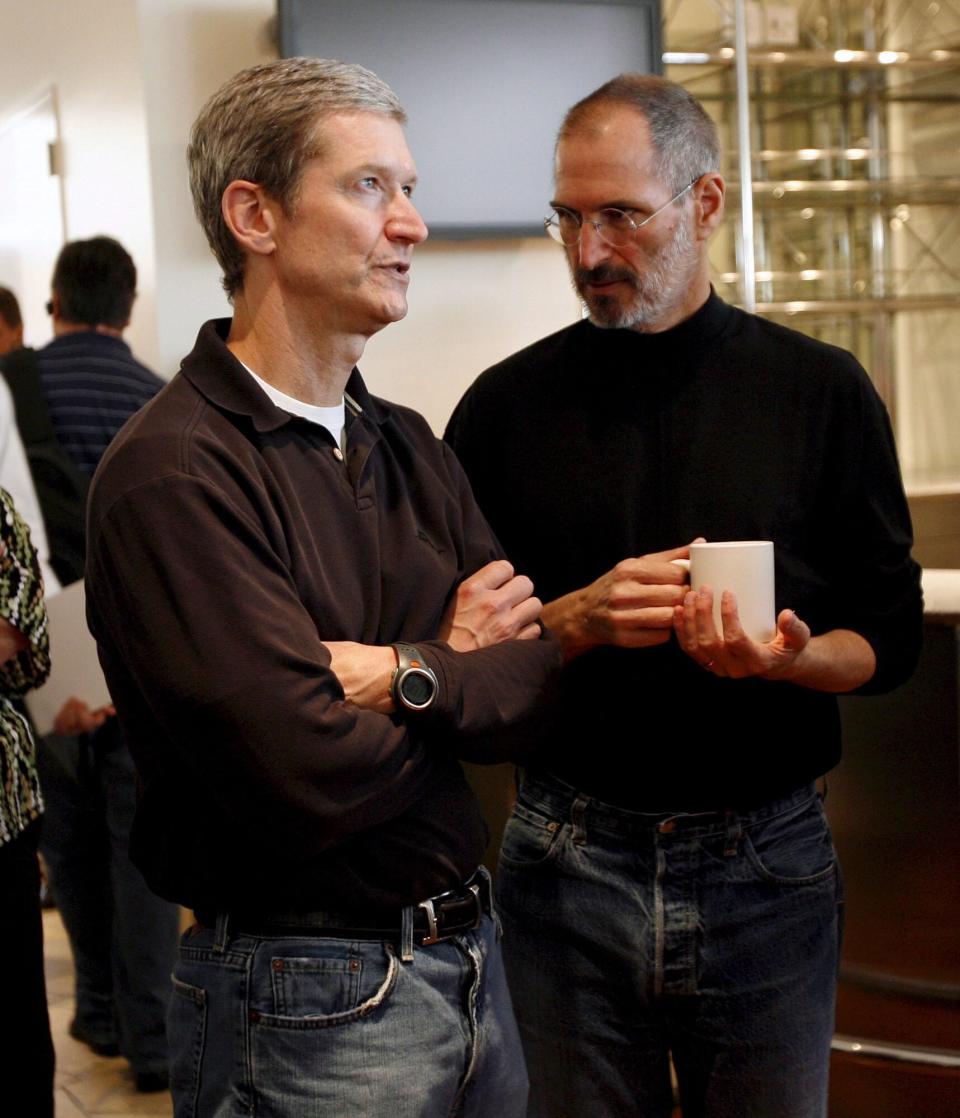A Decade After Becoming Apple's CEO, Tim Cook Says He Never Felt He Had to Fill Steve Jobs’ Shoes

- Oops!Something went wrong.Please try again later.
- Oops!Something went wrong.Please try again later.
Tim Cook was little known outside tech circles when, in August 2011, he took over the role of CEO of Apple from Steve Jobs, the company's innovative and temperamental founder who introduced the world to the iPod, iPhone and iPad. Six weeks later, Jobs passed away from pancreatic cancer.
Some called it the "end of an era," others even said it was "hard to conceive" that "Apple without Steve Jobs would be better."
But as Cook nears his 10-year anniversary as CEO, he has arguably bested his mentor. He's made Apple ubiquitous in our lives, introducing a 5G iPhone, AppleWatch, AirPods Max, iHome and more. (The company was also the first ever to reach a $2 trillion valuation.) And Cook has tried to position himself as one of the good guys in Silicon Valley, speaking up in support of a "fundamental right to privacy" in tech and pushing for changes in areas like racial justice (Apple pledged $100 million to support historic Black colleges and other initiatives) and climate change (the company has committed to being carbon neutral by 2030).
Part of his success, he tells PEOPLE in this week's issue, is that he never felt he had to fill Jobs' shoes. After the company's co-founder died, "it was an exceptionally sad period of time," Cook, 60, says. "It was heartbreaking and it was surprising. And I know that sounds strange, but I've come to realize that when you love someone, and they pass, you convince yourself that they're going to keep bouncing. And then one time he didn't bounce. My main focus at that time was getting the company through the mourning process."
Then he had to chart a path forward.
"I have never tried to fill his shoes, not on day one and not in year 10. Because I've always thought they were not fillable by anyone, for one thing," he says. "Secondly, I think all of us, the challenge we all have is to be the best version of ourselves, and to keep pushing the boundaries of what the best version of yourself is. And so that's what I've done."
For more on Tim Cook and his decade leading Apple, pick up the latest issue of PEOPLE, on newsstands Friday, or subscribe here.

MONICA M DAVEY/EPA/Shutterstock
Jobs, he says, guided him do that: "When he told me he wanted me to be CEO, he said that he never wanted me to ask what he would do," Cook says. "He wanted a professional transition, and he wanted the company to go on."
It helped that Cook and Jobs had worked side by side for 13 years. Cook had been at Compaq, the number one computer company at that time, before coming to Apple in 1998.
"Everybody thought that Apple was headed out. Michael Dell had just made a comment that if he were the CEO of Apple, he would close it down and give the remaining funds to the shareholders," Cook recalls. "And so when I got the call [that] Steve [was] looking for somebody to run operations, [it] caught me by surprise. The second [call], I'm thinking, 'This is an opportunity to talk to the guy that started the whole industry. Obviously I should go talk to him.'"
Listen to PEOPLE Deputy Editor Wendy Naugle's interview with Apple CEO Tim Cook — including discussion on being the first openly gay Fortune 500 CEO and what he learned from Steve Jobs — on the March 18 episode of our new podcast, PEOPLE Every Day, embedded below. Subscribe to the podcast here to get the essential celebrity, entertainment and human interest news stories Monday through Friday.
Cook says it was just moments into their meeting that he realized he would join the team: "I could hear that voice in my head, 'Go west, young man. Go west.' And the rest is history."
If their first meeting was impactful, so was Cook's first day on the job.
"When I came to Apple, my first day on the job, I crossed a picket line to get in the building," he says. "It was a picket line of customers who were protesting because Steve had decided to kill the Newton device, if you remember the Newton."
RELATED: Apple CEO Tim Cook Expects a Post-Pandemic Return to the Office: 'I Can't Wait'

Paul Sakuma/AP/Shutterstock
The Newton was an early personal digital assistant, or PDA, device with handwriting-recognition capabilities.
"I was reflecting on [the protest] on the way to elevator to get to my office," Cook says. "I was thinking of how I'd been involved in thousands of product announcements and withdrawals and, I have to say, few people cared. And all of a sudden, I was working for this company where people felt so strongly about something that they were out protesting. I knew at that moment life was going to be different."

